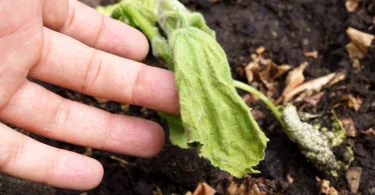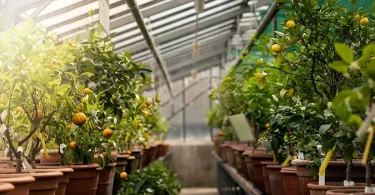Imagine walking out onto your balcony, snipping a few vibrant green leaves, and instantly brightening your next meal. Growing fresh, aromatic herbs right outside your door brings incredible convenience and a burst of flavor no store-bought option can match. This simple practice elevates your cooking and offers peace in our busy city lives. Urban gardening, especially balcony herb gardens, also connects you with nature, adding to your well-being and supporting sustainable habits.
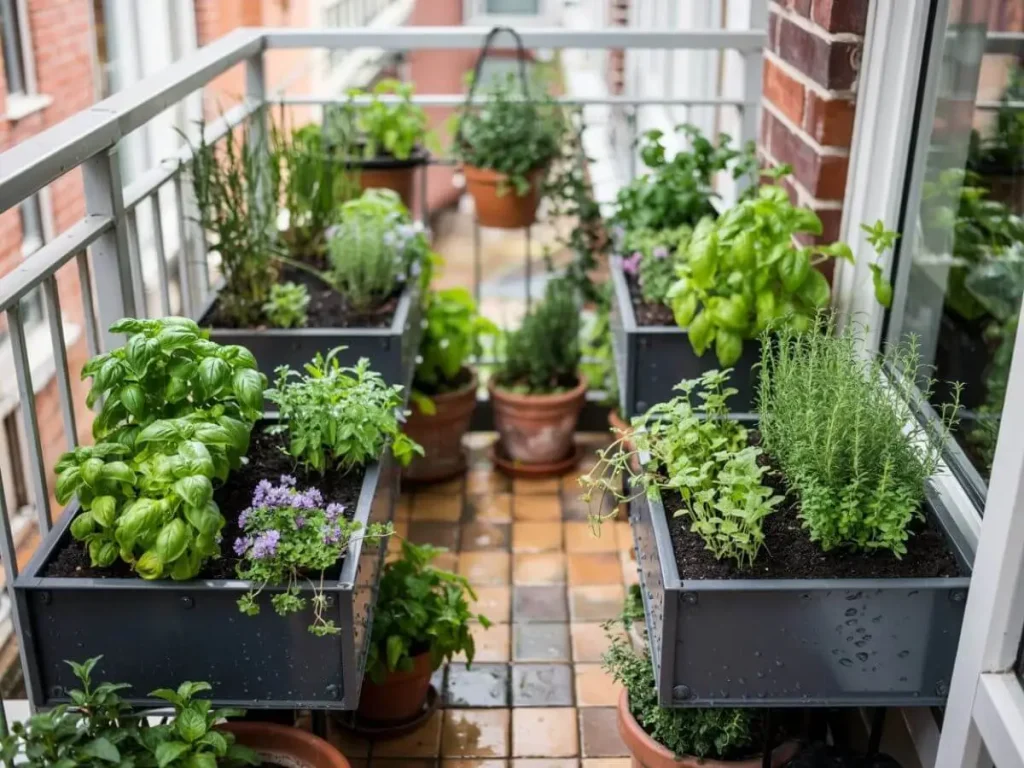
Balcony culinary herbs gardening is an easy and rewarding hobby for anyone, regardless of space. Certain herbs are perfect for pots and containers, thriving in the conditions a balcony provides. You can transform even the smallest outdoor area into a productive green space. Start your journey to delicious, homegrown flavors today.
1. Why Grow Herbs on Your Balcony? The Many Benefits
1.1 Enhance Your Cooking with Fresh Flavors
Fresh herbs truly transform any dish. They add a bright, living taste dried herbs often lack. Think of basil in a Caprese salad or fresh mint in your evening tea; the difference is striking. Growing balcony herbs means you always have these vibrant flavors ready for your kitchen.
For example, snipping fresh chives over scrambled eggs makes them extra special. A sprig of rosemary enhances roasted potatoes like nothing else can. These simple additions bring restaurant-quality taste right to your table. Your cooking will taste better and be more exciting.
1.2 The Joy and Satisfaction of Homegrown Produce
Gardening, even on a small scale, offers many perks for your mood. There is a deep satisfaction in watching seeds sprout and grow into edible plants. Tending to your balcony herbs can reduce stress and offer a peaceful escape from daily worries. It is a simple way to connect with the earth.
Seeing your plants flourish gives a sense of pride and accomplishment. Balcony gardening makes this feeling very accessible. It is less work than a big garden but still offers all the joy of growing your own food. You get to enjoy the fresh air and sunshine, too.
1.3 Space-Saving and Sustainable Living
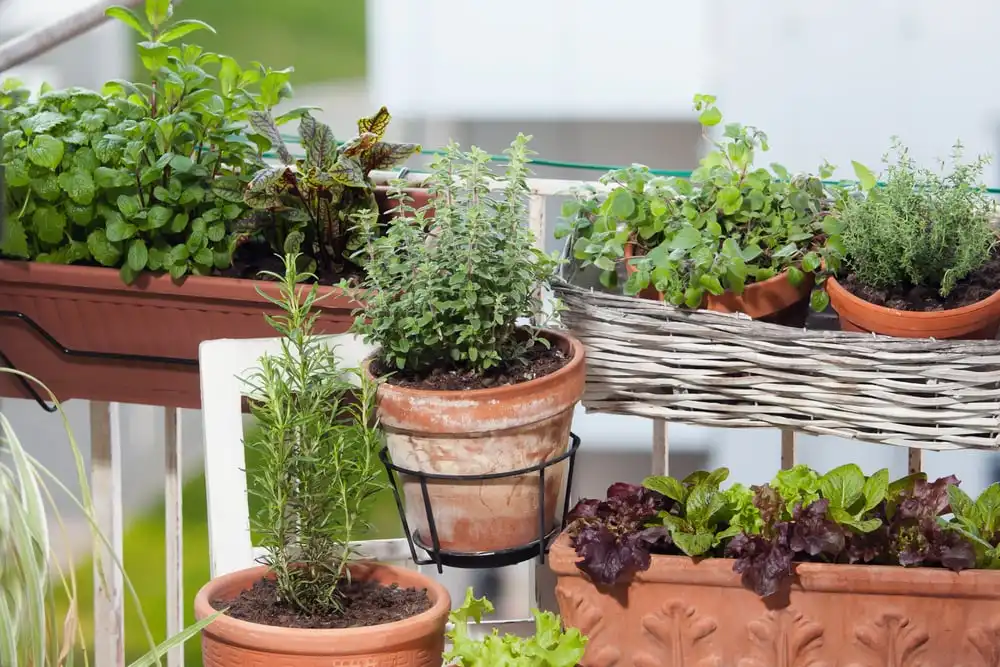
Balcony gardening makes smart use of limited urban spaces. It lets you grow a significant amount of food in a small area. This efficient use of space is perfect for city living. You do not need a large yard to enjoy fresh produce.
Growing your own balcony herbs also cuts down on “food miles” and packaging waste. Your herbs travel just a few steps from plant to plate, which is good for the planet. It is a practical way to support a more sustainable lifestyle right where you live.
2. Essential Considerations for Balcony Herb Gardening
2.1 Choosing the Right Containers and Drainage
Selecting the correct pots is key for happy balcony herbs. Terracotta pots look good and let soil breathe, but they dry out faster. Plastic pots hold moisture well and are lighter, which can be useful. Window boxes work great for herbs that grow tall, like rosemary. Hanging baskets are perfect for trailing plants like thyme.
Every container must have drainage holes at the bottom. These holes let extra water escape, stopping roots from rotting. A minimum pot size of 6-8 inches across is good for most single herb plants. Deeper pots are always better if you have the space.
2.2 Sunlight Requirements: Finding Your Balcony’s Sweet Spot
Most culinary herbs need plenty of sun to thrive. Aim for at least 6 hours of direct sunlight each day. South-facing balconies usually get the most sun all day long. West-facing balconies get strong afternoon sun. East-facing balconies receive gentler morning sun.
North-facing balconies get the least sun; they may work for herbs that like some shade, such as mint. Basil loves full sun and warmth, needing those sunny spots. Mint can tolerate a bit more shade, but it still prefers bright light. Watch how the sun moves across your balcony through the day and over seasons.
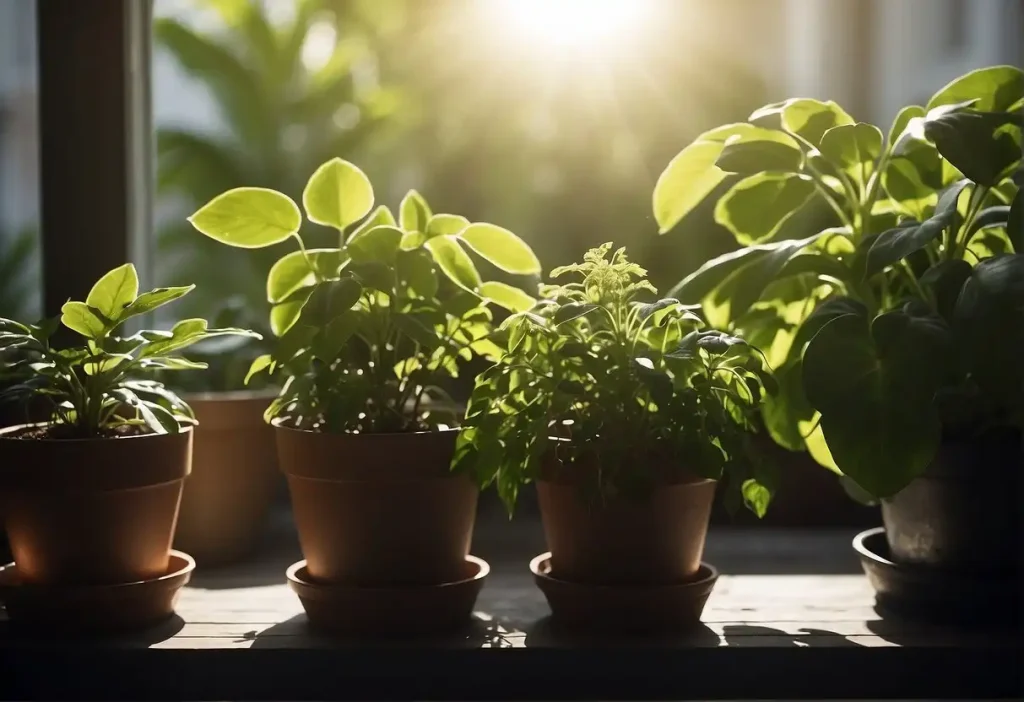
2.3 Soil, Watering, and Feeding for Thriving Plants
A good potting mix is vital for container herbs. Look for a mix that drains well but still holds some moisture. Avoid heavy garden soil, which can compact in pots and lead to root problems. A quality potting mix ensures your herbs get the air and nutrients they need.
Watering correctly is a crucial skill. Check the soil moisture before watering. Stick your finger about an inch into the soil; if it feels dry, it is time to water. Overwatering is a common mistake that can kill herbs. Water until you see it drain from the bottom of the pot. Feed your herbs with a weak liquid fertilizer every few weeks during the growing season.
3. Top Culinary Herbs for Balcony Success
3.1 Basil: The King of Summer Flavors
Basil loves warm weather and sunshine. Many types exist, like Genovese with its classic Italian taste, or Thai basil with a spicier kick. It grows fast during summer, providing many leaves for your dishes. Place it in the sunniest spot on your balcony.
To keep your basil plant producing, pinch off the top sets of leaves. This stops the plant from flowering too early and encourages it to grow bushier. You will get more leaves for longer this way. Harvest leaves as needed, taking from the top.
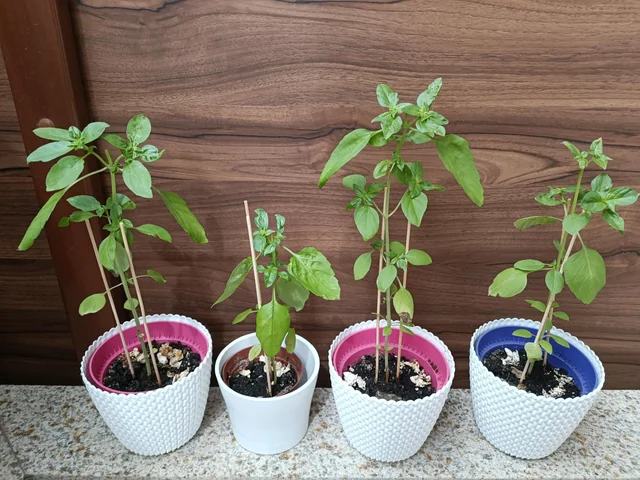
3.2 Mint: Vigorous and Versatile
Mint is a robust herb that grows quickly. It spreads easily, so it is best to keep it in its own pot. This keeps it from taking over other plants in a shared container. Mint likes consistent moisture and can handle some shade, though it prefers bright light.
Enjoy mint in refreshing mojitos or cool iced teas. It also pairs well with lamb dishes or fresh fruit salads. You can even add it to savory sauces for a bright flavor.
3.3 Parsley: A Staple for Garnish and Flavor
Parsley is a kitchen must-have, used for both garnish and deep flavor. You can choose between curly parsley, which is pretty for plating, or flat-leaf (Italian) parsley, which has a stronger taste. It is quite hardy and can handle cooler temperatures.
To harvest parsley, snip the outer stalks close to the base of the plant. This allows new growth to come from the center. Regular harvesting encourages more leaf production. You will have a constant supply for soups and salads.
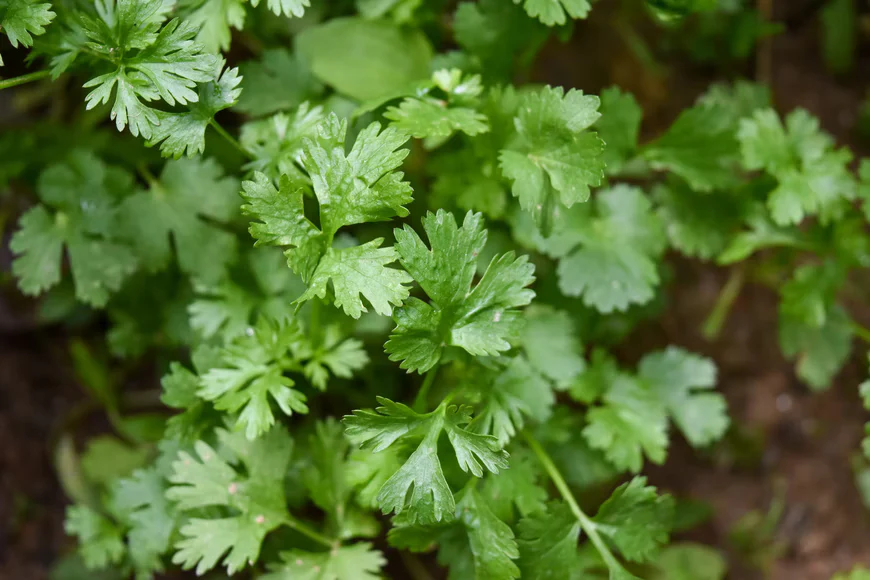
3.4 Rosemary: Aromatic and Hardy
Rosemary is a woody, fragrant herb that does well in pots. It prefers lots of sun and soil that drains quickly. Its pine-like scent fills the air, adding beauty and fragrance to your balcony. Rosemary is known for its hardiness.
Use rosemary sprigs with roasted chicken or potatoes for a savory aroma. You can prune rosemary to keep its shape tidy and encourage new growth. Just cut off the tips of stems after it blooms.
3.5 Thyme: Small Leaves, Big Flavor
Thyme is a drought-tolerant herb that loves sunny, dry spots. Its tiny leaves pack a powerful punch of flavor. It is perfect for Mediterranean dishes and hearty meals. Thyme handles less water than many other herbs.
Its small leaves are ideal for flavoring stews, roasted vegetables, and soups. Try it with roasted chicken or fish. Thyme is very forgiving and a great choice for beginner balcony gardeners.
3.6 Chives: Delicate Onion Notes
Chives have a mild onion flavor and grass-like leaves. They are simple to grow and add a fresh, subtle taste to many foods. Chives are a perennial, meaning they will come back year after year. They are a welcome addition to any herb garden.
Snip the green blades with scissors to harvest. They are perfect tossed into salads, mixed into omelets, or sprinkled over baked potatoes. Chives also produce pretty purple flowers that are edible.
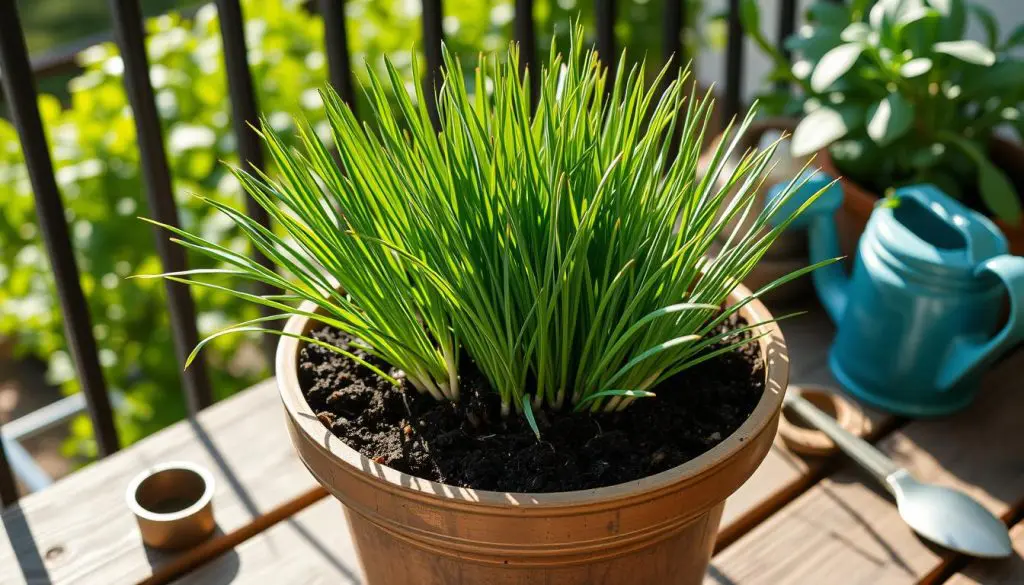
4. Beyond the Basics: Other Balcony-Friendly Herbs
4.1 Cilantro: Fiery Flavor (with a caveat)
Cilantro brings a vibrant, fiery taste to Mexican and Asian dishes. It grows quickly from seed but tends to “bolt,” or go to seed, when the weather gets hot. This means it stops making leaves and grows a flower stalk instead. Plant cilantro seeds every few weeks during cooler months for a steady supply.
This trick, called succession planting, helps ensure you always have fresh leaves. Just sow a small batch of seeds every two to three weeks. This way, as one plant bolts, another is ready to harvest.
4.2 Oregano: Essential for Mediterranean Dishes
Oregano is another sun-lover that prefers dry conditions. It is a staple in Mediterranean food, adding warmth and depth to many recipes. Oregano plants are low-maintenance and can withstand a bit of neglect. This makes it a great balcony choice.
Use fresh oregano in pasta sauces, on pizza, or in a simple Caprese salad with tomatoes and mozzarella. Its robust flavor stands up well in cooked dishes. You can enjoy its strong aroma too.
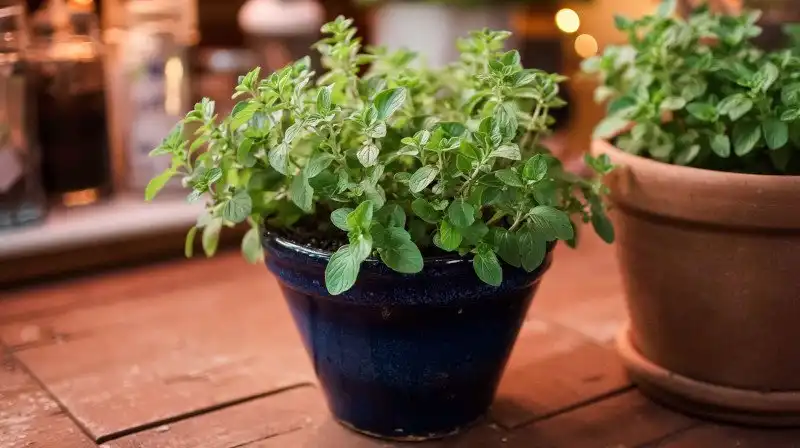
4.3 Dill: Delicate Fronds for Fish and Pickles
Dill has feathery foliage and a unique, slightly sweet flavor. It pairs wonderfully with fish, especially salmon, and is a key ingredient in pickles. The light, airy leaves add a fresh taste to many meals. Dill likes consistent moisture and sun.
Harvest the delicate fronds by snipping them off as needed. Both the leaves and the seeds of dill are edible. It’s a fantastic herb for adding a special touch to your cooking.
5. Troubleshooting Common Balcony Herb Problems
5.1 Pests and Diseases: Identification and Natural Solutions
Balcony herbs can sometimes attract small pests like aphids or spider mites. Check your plants often, especially the undersides of leaves. If you see tiny insects or sticky residue, act quickly. Organic solutions work well for these common problems.
You can spray affected plants with a gentle stream of water to dislodge pests. For tougher issues, use insecticidal soap or neem oil. These natural options are safe for edible plants and your family. Apply them in the evening to avoid harming beneficial insects.
5.2 Yellowing Leaves, Wilting, and Other Signs of Distress
Yellowing leaves often mean too much water, but can also signal too little. Wilting plants usually need water, but overwatering can cause roots to rot, leading to wilt too. Check the soil moisture before you water again. If the soil is soaking wet, let it dry out more between waterings.
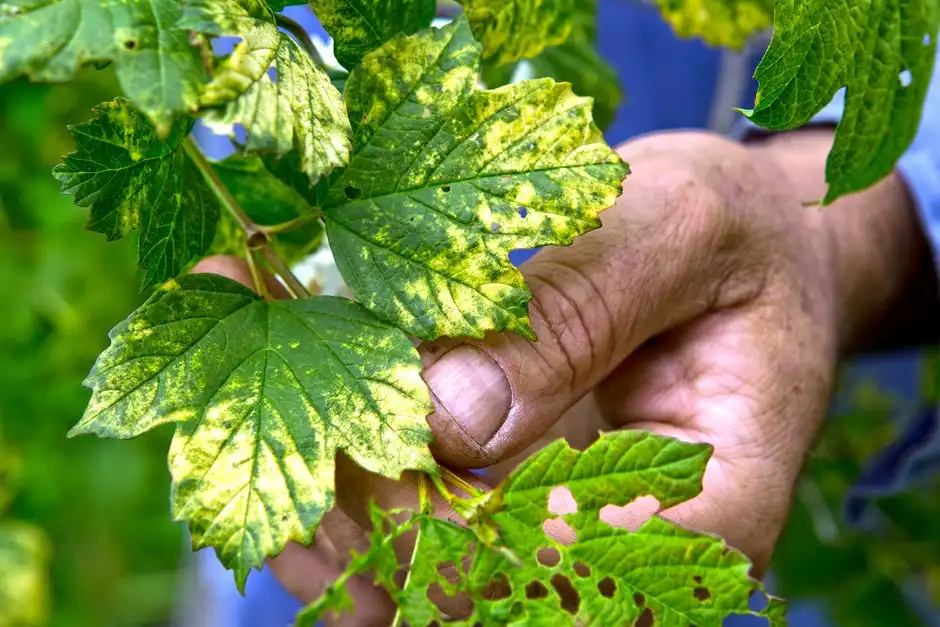
Lack of enough light or nutrients can also cause problems. Move your plants to a sunnier spot if they look pale. Give them a light feeding if they have not been fed recently. Learning to read your plants’ signals helps them thrive.
5.3 Dealing with Overgrowth and Bolting
Some herbs, like mint and basil, can grow very fast. Regular harvesting keeps them from getting too leggy. Trim back vigorous plants often to encourage bushier growth. This also helps you get more leaves to use.
Bolting, when an herb sends up a flower stalk and stops producing leaves, happens in hot weather. Cilantro is a prime example. Pinch off flower buds as soon as you see them to extend the leaf harvest. For herbs like cilantro, planting new seeds every few weeks ensures a continuous supply.
6. Harvesting and Storing Your Balcony Bounty
6.1 Best Practices for Harvesting
Knowing when and how to harvest your herbs gets you the best flavor and keeps your plants healthy. Most herbs taste best when harvested in the morning after the dew has dried. Use sharp scissors or snips to make clean cuts. Always take about one-third of the plant at a time.
For basil and mint, pinch off stems just above a set of leaves. This makes the plant grow two new stems. For parsley and cilantro, cut the outer leaves close to the base. This method promotes ongoing growth and fresh flavor.
6.2 Simple Storage Methods for Freshness
Keeping your fresh herbs fresh is simple. For herbs like parsley and cilantro, trim the stems and place them in a glass of water, like a bouquet of flowers. Cover loosely with a plastic bag and store in the fridge. Change the water every day or two.
Hardier herbs like rosemary and thyme can be wrapped in a damp paper towel and stored in a sealed bag in the fridge. This helps them last longer. They will stay fresh for about a week.
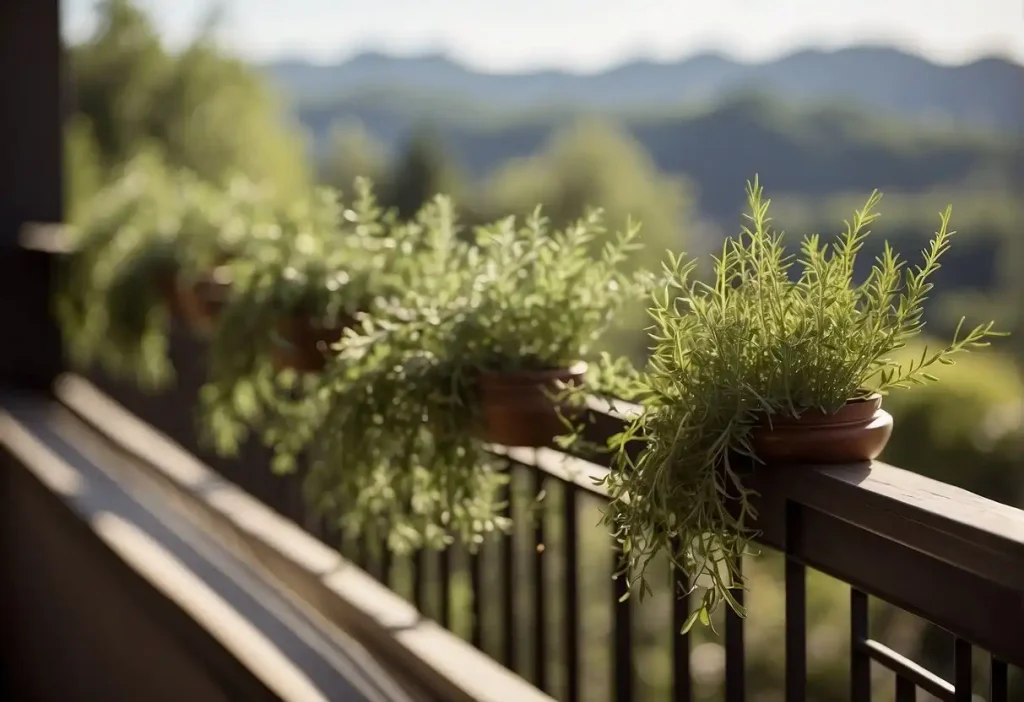
6.3 Preserving Herbs for Longer Enjoyment
When you have too many herbs, preservation extends their use beyond the growing season. Drying herbs is a classic method. Tie bundles of herbs and hang them in a cool, dark, airy place. Once dry, crumble them and store them in airtight containers.
Freezing herbs is another great option. Chop fresh herbs and place them in ice cube trays with a little water or olive oil. Once frozen, transfer the cubes to a freezer bag. These cubes are perfect for adding flavor directly to soups and sauces all winter long.
Conclusion
Growing culinary herbs on your balcony offers incredible rewards. It’s easy, adds fresh flavor to your meals, and brings joy to your daily life. Even with limited space, you can enjoy a vibrant, productive garden.
Start small, perhaps with just a few of your favorite herbs like basil or mint. As you gain confidence, you can expand your collection and try new varieties. Get planting today and enjoy the wonderful, fresh flavors of your very own homegrown herbs.


